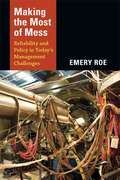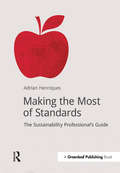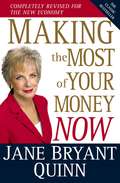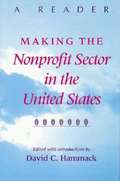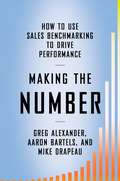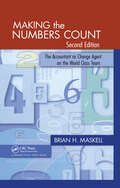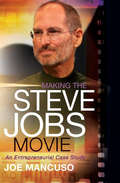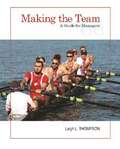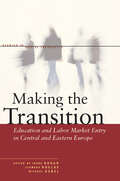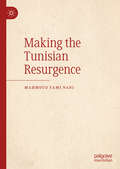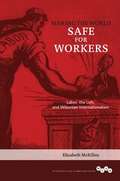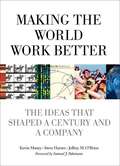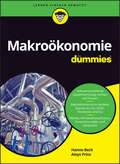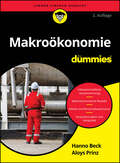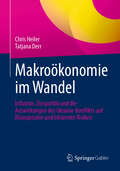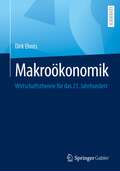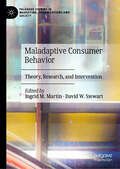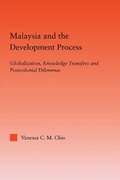- Table View
- List View
Making the Most of Mess: Reliability and Policy in Today's Management Challenges
by Emery RoeIn Making the Most of Mess, Emery Roe emphasizes that policy messes cannot be avoided or cleaned up; they need to be managed. He shows how policymakers and other professionals can learn these necessary skills from control operators who manage large critical infrastructures such as water supplies, telecommunications systems, and electricity grids. The ways in which they prevent major accidents and failures offer models for policymakers and other professionals to manage the messes they face. Throughout, Roe focuses on the global financial mess of 2008 and its ongoing aftermath, showing how mismanagement has allowed it to morph into other national and international messes. More effective management is still possible for this and many other policy messes but that requires better recognition of patterns and formulation of scenarios, as well as the ability to translate pattern and scenario into reliability. Developing networks of professionals who respond to messes is particularly important. Roe describes how these networks enable the avoidance of bad or worse messes, take advantage of opportunities resulting from messes, and address societal and professional challenges. In addition to finance, he draws from a wide range of case material in other policy arenas. Roe demonstrates that knowing how to manage policy messes is the best approach to preventing crises.
Making the Most of Standards: The Sustainability Professional's Guide
by Adrian HenriquesThe world of corporate responsibility standards can seem large and confusing. With so many different standards, it is often bewildering. Sustainability standards feed into a broad spectrum of other standards and finding the appropriate standard for your organization's needs is vital. This short book cuts through the confusion. It explains: 1. The pros and cons of using standards to improve sustainability performance 2. The variety of standards out there 3. A map showing how some of the most prominent sustainability standards relate to each other 4. A decision tree to help with choosing the type of standard that will be most helpful to you 5. For some of the most influential standards, a thumbnail description of what they are actually about 6. Some tips for putting standards into practice.
Making the Most of Your Money Now
by Jane Bryant QuinnConsumers Union named Making the Most of Your Money the best personal finance book on the market. Now Jane Bryant Quinn's bestseller has been completely revised and updated for 2010 and beyond. America's most trusted financial adviser, who helped millions of readers meet their goals in the 1990s, has done it again -- providing a guide to financial recovery, independence, and success in the new economy. Getting your financial life on track and keeping it there -- nothing is more important to your family and you. This proven, comprehensive guidebook steers you around the risks and helps you make smart and profitable decisions at every stage of your life. Are you single, married, or divorced? A parent with a paycheck or a parent at home? Getting your first job or well along in your career? Helping your kids in college or your parents in their older age? Planning for retirement? Already retired and worried about how to make your money last? You'll find ideas to help you build your financial security here. Jane Bryant Quinn answers more questions more completely than any other personal-finance author on the market today. You'll reach for this book again and again as your life changes and new financial decisions arise. Here are just a few of the important subjects she examines: Setting priorities during and after a financial setback, and bouncing back Getting the most out of a bank while avoiding fees Credit card and debit card secrets that will save you money Family matters -- talking money before marriage and mediating claims during divorce Cutting the cost of student debt, and finding schools that will offer big "merit" scholarships to your child The simplest ways of pulling yourself out of debt Why it's so important to jump on the automatic-savings bandwagon Buying a house, selling one, or trying to rent your home when buyers aren't around Why credit scores are more important than ever, plus tips on keeping yours in the range most attractive to lenders Investing made easy -- mutual funds that are tailor-made for your future retirement What every investor needs to know about building wealth How an "investment policy" helps you make wise decisions in any market The essential tax-deferred retirement plans, from 401(k)s to Individual Retirement Accounts -- and how to manage them How to invest in real estate at a bargain price (and how to spot something that looks like a bargain but isn't) Eleven ways of keeping a steady income while you're retired, even after a stock market crash Financial planning -- what it means, how you do it, and where to find good planners Page by page, Quinn leads you through the pros and cons of every decision, to help you make the choice that will suit you best. This is the single personal-finance book that no family should be without.
Making the Most of Your Placement (SAGE Study Skills Series)
by John Neugebauer Jane Evans-BrainA new addition to the SAGE Study Skills series, this book is an invaluable resource for any business and management student intending to do a work placement as part of their degree. The text provides practical and thorough advice to help students select, prepare and navigate through organizational life. The book covers every step of the work placement process, from planning, making contact and interviewing, through to reflective learning and how to make the most of the placement experience and the opportunities it presents for future careers Each chapter features testimonials from students who have done placement years, offering experiences and advice Checklists to help students cover every consideration for commencing on their placement An extensive list of useful websites and contacts, as well as further reading suggestions. SAGE Study Skills are essential study guides for students of all levels. From how to write great essays and succeeding at university, to writing your undergraduate dissertation and doing postgraduate research, SAGE Study Skills help you get the best from your time at university. Visit the SAGE Study Skills hub for tips, resources and videos on study success!
Making the Most of the Water We Have: The Soft Path Approach to Water Management
by David B. Brooks Oliver M. BrandesStephen GurmanBased on the ‘soft path approach to the energy sector, a transition is now under way to a soft path for water. This approach starts by ensuring that ecosystem needs for water are satisfied and then undertakes a radical approach to reducing human uses of water by economic and social incentives, including open decision-making, water markets and equitable pricing, and the application of super-efficient technology, all applied in ways that avoid jeopardizing quality of life. The soft path for water is therefore a management strategy that frees up water by curbing water waste. This book is the first to present and apply the water soft path approach. It has three aims: to bring to a wider audience the concept and the potential of water soft paths; to demonstrate that soft path analysis is analytical and practical, and not justeco-dreaming ; and to indicate that soft paths are not only conceptually attractive but that they can be made economically and politically feasible. Includes a tool kit for planners and other practitioners. Published with POLIS Project and Friends of the Earth
Making the Nonprofit Sector in the United States: A Reader
by David C. Hammack"It is a delight to seen an anthology on nonprofit history done so well."—Barry Karl, John F. Kennedy School of Government, Harvard University"This is a volume that everyone concerned about nonprofits—scholar, practitioner, and citizen—will find useful and illuminating."—Peter Dobkin Hall, Program on Non-Profit OrganizationsYale Divinity School"A remarkable book."—Robert Putnam, John F. Kennedy School of Government, Harvard University[One to come from John Simon, School of Law, Yale University by Jan. 13th and others are being solicited.] Unique among nations, America conducts almost all of its formally organized religious activity, and many cultural, arts, human service, educational, and research activities through private nonprofit organizations. Though partially funded by government, as well as by fees and donations, American nonprofits have pursued their missions with considerable independence. Many have amassed remarkable resources and acquired some of the most impressive hospital, university, performing arts, and museum facilities in the world. While some have amassed large endowments, many that surpass one billion dollars, there are also hundreds of thousands of small nonprofits, most with no tangible resources at all. How did the United States come to rely so heavily on nonprofits? Why has it continued to do so? What purposes do Americans seek to advance through nonprofits? How have Americans sought to control them? How have nonprofits been effected by the growth of government in the twentieth century? These questions suggest the complexity of the history of nonprofits in the United States. To help explore that history, this reader presents some of the classic documents in the development of the nonprofit sector along with important interpretations by recent scholars. The selections can be considered a representative part of a single extended conversation by the men and women who have taken part in the effort to define America and the American dream, even as they shaped what we now call the nonprofit sector. The statements by participants in the growth and development of the nonprofit sector are accompanied by essays written by historians and social scientists that provide concise surveys of important issues and periods. The essays give voice to those whose contributions to the American debate about voluntary associations and private institutions would otherwise be difficult to find or comprehend.The selections can be considered a representative part of a single extended conversation by the men and women who have taken part in the effort to define America and the American dream, even as they shaped what we now call the nonprofit sector. The statements by participants in the growth and development of the nonprofit sector are accompanied by essays written by historians and social scientists that provide concise surveys of important issues and periods. The essays give voice to those whose contributions to the American debate about voluntary associations and private institutions would otherwise be difficult to find or comprehend. Each selection has been chosen to define or illuminate important questions in the development of the nonprofit sector in the United States. Many include criticisms of particular nonprofit efforts, or of nonprofit activity in general. The intention is to provoke thought, not to establish an official list of readings. Though not every point of view could be included, the reader does reflect a general understanding of the nature of the nonprofit sector and its significance in the development of the United States. Philanthropic Studies—Dwight F. Burlingame and David C. Hammack, general editors
Making the Number: How to Use Sales Benchmarking to Drive Performance
by Greg Alexander Aaron Bartels Mike DrapeauThe essential tool kit to achieve breakthrough sales performance improvements.Numbers don't lie: 40 percent of all salespeople miss their targets each year. How can sales managers ensure their teams are doing everything possible? <P><P>The key lies in benchmarking, which is not new for finance or manufacturing but rarely gets applied to sales. Making the Number will teach executives to embrace data-driven decision making and rely less on gut instinct.Comparing a sales force to those of relevant peers leads to many opportunities to improve performance. The authors take readers through their five-step methodology for sales benchmarking, showing how to select metrics; gather, compute, and compare internal and external data; and then actually use the data.Making the Number includes case studies of sales benchmarking in action. <P>For example, find out how Discover Financial Services plays David to the Goliaths of MasterCard and Visa.Whether you're a sales rep, a manager, or a CEO, this book will show you a better way to make your number.
Making the Numbers Count: The Accountant as Change Agent on the World-Class Team
by Brian H. MaskellThe first edition of Brian Maskell‘s now classic work proved that when given the chance, accountants would prefer not to serve out their working days as number crunching automatons. With its energetic tone and common sense approach, the book inspired numbers people at all levels to become true allies in their companies lean revolutions. It enco
Making the Steve Jobs Movie: An Entrepreneurial Case Study
by Joe MancusoThe producer of the hit film, Jobs, shares his visions of Hollywood, big business, and entrepreneurial success with America&’s most powerful CEOs. How did Mark Hulme make a journey from Fort Worth, Texas, publisher to first-time movie producer who wrangled Ashton Kutcher to star in one of the most highly anticipated biopics ever made? It&’s a story right of Steve Jobs&’s own playbook for success: start with a good idea and the drive to seek the resources that&’ll turn that concept into reality. This is the illuminating and unique guide to accomplishing those dreams. Joe Mancuso—founder of CEO Clubs and with more than fifty years of experience as an entrepreneur—assembles twenty diverse CEOs to discuss the genius and nerve behind two effectual lynchpins: the founder of Apple himself, and Mark Hulme who took the risk to bring Jobs&’s story to the big screen. In these lively, informative, and invaluable conversations, Mancuso, Hulme, and their peers illustrate how you, too, can apply the same principles and efforts into your own personal success story.
Making the Team: A Guide for Managers
by Leigh ThompsonFor undergraduate or graduate management courses in Organization Behavior, Group Dynamics, or Teamwork. Equips team leaders and members for success with theory and real-world applications. Making the Team shows leaders how to design teams to function optimally, and focuses on the skills needed to become productive team members. The 6th Edition combines cutting-edge theory with the latest information and research, while its real-world applications and examples help team leaders and members succeed in the business world.
Making the Transition
by Irena Kogan Clemens Noelke Michael GebelAfter the breakdown of socialism in Central and Eastern Europe, the role of education systems in preparing students for the "real world" changed. Though young people were freed from coercive state institutions, the shift to capitalism made the transition from school to work much more precarious and increased inequality in early career outcomes. This volume provides the first large-scale analysis of the impact social transformation has had on young people in their transition from school to work in Central and Eastern European countries. Written by local experts, the book examines the process for those entering the workforce under socialism, during the turbulent transformation years, in the early 2000s, and today. It considers both the risks and opportunities that have emerged, and reveals how they are distributed across social groups. Only by studying these changes can we better understand the long-term impact of socialism and post-socialist transformation on the problems young people in this part of the world are facing today.
Making the Tunisian Resurgence
by Mahmoud Sami NabiThis book investigates the socioeconomic factors that triggered Tunisia’s "revolution for dignity” and the current issues and challenges facing its economy while suggesting mechanisms and instruments for their resolution. The author begins by analyzing the roots of the revolution and the post-revolution situation from a political sociology perspective and then diagnoses the Tunisian economy before and after the revolution and identifies the multidimensional binding constraints preventing it from escaping the middle-income trap. The book then explores the pillars of an inclusive development strategy that Tunisia should pursue. The emphasis is made on building inclusive institutions, developing a new social contract and reinventing the country's leadership. Beyond the institutional dimension, the author suggests innovative financial channels, discusses the strategy of a successful integration of the Tunisian economy in the global economy as well as the pillars of its transformation into a knowledge-based economy.
Making the World Safe for Workers: Labor, the Left, and Wilsonian Internationalism (The Working Class in American History)
by Elizabeth McKillenIn this intellectually ambitious study, Elizabeth McKillen explores the significance of Wilsonian internationalism for workers and the influence of American labor in both shaping and undermining the foreign policies and war mobilization efforts of Woodrow Wilson's administration. McKillen highlights the major fault lines and conflicts that emerged within labor circles as Wilson pursued his agenda in the context of Mexican and European revolutions, World War I, and the Versailles Peace Conference. As McKillen shows, the choice to collaborate with or resist U.S. foreign policy remained an important one for labor throughout the twentieth century. In fact, it continues to resonate today in debates over the global economy, wars in Iraq and Afghanistan, and the impact of U.S. policies on workers at home and abroad.
Making the World Work Better: The Ideas That Shaped a Century and a Company
by Kevin Maney Steve Hamm Jeffrey O'BrienThomas J Watson Sr’s motto for IBM was THINK, and for more than a century, that one little word worked overtime. In Making the World Work Better: The Ideas That Shaped a Century and a Company , journalists Kevin Maney, Steve Hamm, and Jeffrey M. O’Brien mark the Centennial of IBM’s founding by examining how IBM has distinctly contributed to the evolution of technology and the modern corporation over the past 100 years. <p><p> The authors offer a fresh analysis through interviews of many key figures, chronicling the Nobel Prize-winning work of the company’s research laboratories and uncovering rich archival material, including hundreds of vintage photographs and drawings. The book recounts the company’s missteps, as well as its successes. It captures moments of high drama – from the bet-the-business gamble on the legendary System/360 in the 1960s to the turnaround from the company’s near-death experience in the early 1990s. <p> The authors have shaped a narrative of discoveries, struggles, individual insights and lasting impact on technology, business and society. Taken together, their essays reveal a distinctive mindset and organizational culture, animated by a deeply held commitment to the hard work of progress. IBM engineers and scientists invented many of the building blocks of modern information technology, including the memory chip, the disk drive, the scanning tunneling microscope (essential to nanotechnology) and even new fields of mathematics. IBM brought the punch-card tabulator, the mainframe and the personal computer into the mainstream of business and modern life. IBM was the first large American company to pay all employees salaries rather than hourly wages, an early champion of hiring women and minorities and a pioneer of new approaches to doing business--with its model of the globally integrated enterprise. And it has had a lasting impact on the course of society from enabling the US Social Security System, to the space program, to airline reservations, modern banking and retail, to many of the ways our world today works. <p> The lessons for all businesses – indeed, all institutions – are powerful: To survive and succeed over a long period, you have to anticipate change and to be willing and able to continually transform. But while change happens, progress is deliberate. IBM – deliberately led by a pioneering culture and grounded in a set of core ideas – came into being, grew, thrived, nearly died, transformed itself… and is now charting a new path forward for its second century toward a perhaps surprising future on a planetary scale.
Makroökonomie für Dummies (Für Dummies)
by Hanno Beck Aloys PrinzIn diesem Buch wandern Hanno Beck und Aloys Prinz mit Ihnen durch die Vielfalt der makroökonomischen Theorien, insbesondere der Konjunktur- und Wachstumsmodelle. Sie bringen Ihnen das Geld und seine makroökonomische Bedeutung näher und zeigen Ihnen, wie die Volkswirtschaftliche Gesamtrechnung aufgebaut ist. Dabei lassen sie auch kritische Fragestellungen nicht außen vor, so dass Sie dieses Buch umfassend über Makroökonomik informiert und gleichzeitig zu einer kritischen Auseinandersetzung damit motiviert und befähigt.
Makroökonomie für Dummies (Für Dummies)
by Hanno Beck Aloys PrinzVerstehen, wie moderne Volkswirtschaften funktionieren In diesem Buch wandern Hanno Beck und Aloys Prinz mit Ihnen durch die Vielfalt der makroökonomischen Theorien, insbesondere der Konjunktur- und Wachstumsmodelle. Sie bringen Ihnen die makroökonomische Bedeutung von Geld näher und zeigen Ihnen, wie die Volkswirtschaftliche Gesamtrechnung aufgebaut ist. Das Buch vermittelt den Lehrstoff, den ein Bachelorstudium abdeckt, und lässt dabei auch kritische Fragestellungen nicht außen vor, sodass Sie dieses Buch umfassend über Makroökonomik informiert und gleichzeitig zu einer kritischen Auseinandersetzung damit motiviert und befähigt. Sie erfahren Wissenswertes über Beschäftigung, Preisstabilität und Wachstum Was Sie über die Volkswirtschaftliche Gesamtrechnung wissen sollten Welche wichtigen makroökonomischen Theorien es gibt
Makroökonomie im Wandel: Inflation, Zinspolitik und die Auswirkungen des Ukraine-Konflikts auf Bilanzposten und inhärente Risiken
by Tatjana Derr Chris HeilerDieses Buch analysiert, wie sich gegenwärtige Geschehnisse – die Covid-19-Pandemie, der Ukraine-Konflikt, die Inflation und die Leitzinsanpassungen – auf inhärente Risiken und Bilanzposten von Unternehmen auswirken. Der Schwerpunkt liegt auf einer theoretisch-deskriptiven Analyse, welche die tiefgreifenden Auswirkungen dieser makroökonomischen Phänomene auf inhärente Risikofaktoren umfassend beleuchtet. Danach folgt eine empirische Untersuchung ausgewählter Unternehmen des DAX-40-Index, um die in der Theorie vorhergesagten ökonomischen Entwicklungen zu validieren. Durch diese Verknüpfung von Theorie und Empirie werden nicht nur abstrakte Konzepte verstehbar gemacht, sondern auch die konkreten Auswirkungen auf Unternehmen und deren Bilanzen. Es unterstützt damit Wissenschaftler und Praktiker, Herausforderungen und Chancen in einem komplexen wirtschaftlichen Umfeld besser zu verstehen und etwaige Handlungsbedarfe für Unternehmen abzuleiten.
Makroökonomik - Schnell erfasst (Wirtschaft – Schnell erfasst)
by Robert RichertAnschaulicher, leicht nachvollziehbarer, kompakter Überblick über die traditionelle Makroökonomik. Neben der (neo)klassischen Theorie behandelt der Autor keynesianische Modelle wie das IS-LM-, das Blinder-Solow- und das Mundell-Fleming-Modell. Mit Kapiteln zur neoklassischen Synthese als integrativem Ansatz von angebots- und nachfrageorientierten makroökonomischen Theorien und zur Phillips-Kurven-Diskussion. Plus: Überblick über die Prinzipien der sozialen Marktwirtschaft. Sehr gut geeignet zum Selbststudium: Zusammenfassungen, Wiederholungsfragen, Aufgaben mit Lösungen zu jedem Kapitel, zahlreiche Grafiken und ausführliche Kommentare.
Makroökonomik: Wirtschaftstheorie für das 21. Jahrhundert
by Dirk EhntsIn diesem Buch geht es um die Makroökonomik, um Geldschöpfung und -vernichtung, Vollbeschäftigung, Preisstabilität und nachhaltige Ressourcenbewirtschaftung. Dabei wird mikrofundiert mit einem Bilanzansatz die Geldschöpfung der Banken, Nichtbanken, Zentralbanken und der Bundesregierung vorgestellt und ihr Zusammenspiel im Wirtschaftskreislauf erklärt. Der gewählte Ansatz beinhaltet die neuesten Erkenntnisse und auch aktuelle Entwicklungen wie Sondervermögen, TARGET2-Salden und Energiepreisinflation. Fallstudien und anwendungsbezogene Beispiele zeigen praxisnah, wie privater, staatlicher Sektor und der Rest der Welt auf der gesamtwirtschaftlichen Ebene miteinander interagieren. Mithilfe einfacher Verhaltensannahmen können die Interaktionen in einem grafischen Modell nachvollzogen werden, in welchem konjunkturelle Schwankungen genauso wie wirtschaftspolitische Maßnahmen der Geld- und Fiskalpolitik simuliert werden können. Ein besonderer Schwerpunkt liegt dabei auf Deutschland und der Eurozone. Kapitel zu Beschäftigung und Inflation sowie Deflation runden das Buch ab.
Maladaptive Consumer Behavior: Theory, Research, and Intervention (Palgrave Studies in Marketing, Organizations and Society)
by David W. Stewart Ingrid M. MartinThis edited volume provides a marketing perspective on maladaptive consumer behavior, especially behavior with dysfunctional consequences that does not have its origins in physical addiction. It brings together contributions of leading scholars who have expertise in various forms of maladaptive consumption. The chapters address specific manifestations of maladaptive consumption, such as those related to food, alcoholic beverages, online gaming, and media consumption, among others, with an emphasis on behaviors that are not traditionally regarded as arising from physical addiction. Further, the book includes chapters that focus more broadly of definitional and conceptual issues, methodological approaches, implications for intervention and regulation, and the value judgments inherent in the identification and classification of behaviors as “maladaptive." It examines numerous alternative theories of maladaptive consumption and places such behavior in a larger market context. Taken together, the contributions in this volume (1) describe the general phenomenon of maladaptive consumption, (2) describe specific manifestations of maladaptive consumption, (3) identify issues of research methodology and definition related to the study of maladaptive consumption, and (4) address relevant interventions, regulations, and public policy issues. It will appeal to scholars interested in maladaptive consumption behaviors and their treatments as well as consumer behavior more generally across multiple fields, including marketing, clinical psychology, social work, and public health.
Malaysia and the Development Process: Globalization, Knowledge Transfers and Postcolonial Dilemmas (Studies in International Relations)
by Vanessa C.M. ChioDrawing on recent deconstructions in anthropology, postcolonial studies, and critical sociology, Malaysia and the Development Process situates and explores the phenomenon of international knowledge transfers within the context of globalization. Based on primary and secondary research, and a series of 'experiential' reflections, fieldwork was conducted in two foreign electronics multinationals and a variety of public and semi-public institutions. The findings reassess issues of knowledge, power, subjectivity and agency, and the relations between the West and the non-West, as they are negotiated between and within multinational workplaces and local agencies in Malaysia.
Malaysia: An "Asian Tiger" Reawakens
by Richard H.K. VietorOn May 9th, 2018, in an extraordinary upset, Mahathir Mohamad again became Malaysia's Prime Minister. Najib Razak, who had headed the government since 2009, had been swept up in the 1MDB scandal - perhaps the biggest state-corruption incident in history. Although Malaysia's growth had remained solid since the financial crisis, the scandal undermined the budget, the country's debt position, and foreigners' willingness to invest. What was it in the history, culture and institutional structure of the country that had allowed 1MDB to happen. And could the 93 year-old Mahathir get the country back on track?
Malaysia: Capital and Control
by Laura Alfaro Rawi AbdelalOn September 1, 1998, the government of Malaysia imposed currency and capital controls in response to the financial crisis that had swept Asia. The controls sparked an enormous controversy in the world of international finance. Some celebrated the controls for insulating the Malaysian economy from the unstable international financial system. Others criticized the controls for trapping investors and allowing the government to protect the interests of "cronies." This debate also raised the central question about the future of the international financial architecture: What is the appropriate balance between financial market freedom and government discretion in the management of the global economy?
Malaysia: From Crisis to Recovery
by Kanitta MeesookThis publication takes stock of economic developments in Malaysia since the Asian economic crisis of 1997. It looks at the aspects of economic performance, policy and reform that contributed to the strong recovery. The individual papers include: a comparative review of policies and performance; potential output and inflation; challenges to fiscal management; capital controls in response to the Asian crisis; financial sector issues; corporate performance and reform.
